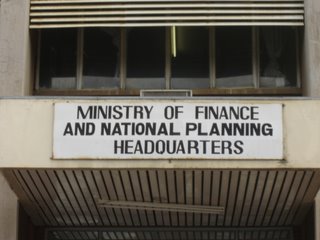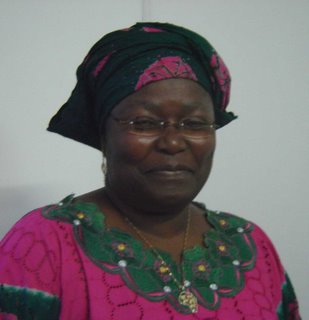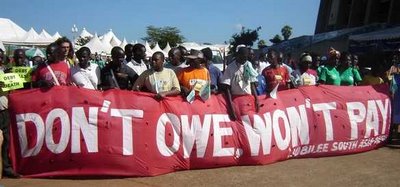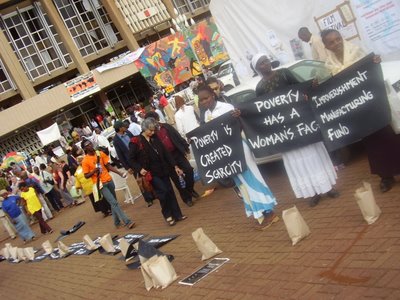
(With very humble apologies to Eliot Weinberger.)
Yesterday, we heard some different stories. The director of Bwafwano Community School and Home-based Care Service - which serves a community of 70,000 poor people on the outskirts of Lusaka - told us that although official statistics say that 68% of Zambians live on less than $1 a day, in her community she suspects the true figure is closer to 95%. We heard her insist that policies imposed by the International Monetary Fund (IMF) and wother lending institutions were to blame for this poverty.
Later, we heard the resident representative of the IMF say that the main Lusaka hospital was 'horrible', and that he would 'rather die than go there'. We heard him ask what he could do, and dispute that IMF salary caps for public workers were adding to the appalling drain of skilled healthcare staff out of the country. He admitted that the IMF suggestion of adding VAT to food and mostquito nets was 'insensitive' and probably should not have been made. We also heard him say that parliament should not have the right to scrutinise loan agreements, and that he  didn't think the IMF should try to be more active in making its information available. We heard him say that he thinks the IMF does better when it is 'lurking in the background'.
didn't think the IMF should try to be more active in making its information available. We heard him say that he thinks the IMF does better when it is 'lurking in the background'.
Yesterday and today, I also heard what campaign groups are doing in Zambia, separately and together. I heard about the launch of Mine Watch Zambia, which is revealing and examining the terms under which Zambia's mines were privatised. I heard Nachilala Nkombo of Jubilee Zambia say how much we have achieved and will achieve working together. And I heard Emily Sikazwe (pictured left) of Women for Change say, 'The struggle continues'.
Wednesday, January 31, 2007
What I heard in Lusaka
Monday, January 29, 2007
Brain drain

The doctors, nurses and other healthworkers we have met so far have made a heartfelt plea to improve salaries and conditions to stem the brain drain from the health system. For instance, Dr Evaristo Kunka – one of three government-employed doctors in Siavonga district, home to 70,000 people – explained how most of his classmates now earn four times as much in Namibia or South Africa. But he also explained why he stays: ‘When you get in these rural areas, you see real poverty. We complain about our salaries, but there are people out there who really need our help.’
But at the Finance Ministry, the need to pay doctors more was just one item on a huge government wish-list. The government currently has a funding gap of over £370 million for its national development plan. Debt relief from the G8 deal is saving money: but only about £25 million this year. This is necessary – but not nearly enough. And there is still the concern that if the IMF imposes limits on what the government can spend, even having more resources is of little help. (The Finance Ministry also became last in a long line of places where we heard about the abuse of tax breaks in Zambia by transnational companies.) Today, we also saw Mulima Akapelwa who spoke at the human chain around the G8 summit in Birmingham in 1998, and at the Make Poverty History G8 rally in Edinburgh in 2005. She argued that, ‘The people themselves should set their own conditions, with the government, not the IMF. The government should say: “These are the conditions the people want, in terms of transparency and accountability.”’ We spoke with Emily Sikazwe and some of the other staff at the immensely inspiring Women for Change organisation. They talked about their work with women and men in the most rural areas – and of the need to avoid a new debt crisis by dealing with Zambia’s poverty situation and IMF conditions: ‘If you cancel debt and still keep creating an environment where new debt is needed in future, then you still have a problem.’
Today, we also saw Mulima Akapelwa who spoke at the human chain around the G8 summit in Birmingham in 1998, and at the Make Poverty History G8 rally in Edinburgh in 2005. She argued that, ‘The people themselves should set their own conditions, with the government, not the IMF. The government should say: “These are the conditions the people want, in terms of transparency and accountability.”’ We spoke with Emily Sikazwe and some of the other staff at the immensely inspiring Women for Change organisation. They talked about their work with women and men in the most rural areas – and of the need to avoid a new debt crisis by dealing with Zambia’s poverty situation and IMF conditions: ‘If you cancel debt and still keep creating an environment where new debt is needed in future, then you still have a problem.’
Sunday, January 28, 2007
Whose country is it anyway?

Talking to partner organisations, politicians and frontline workers in Zambia reveals considerable concern about how the benefits of debt cancellation can be properly felt – and in particular, who is making the relevant decisions.
Zambia has had over 90% of the debt that it owed at the end of 2004 cancelled – a large chunk of that thanks to the debt deal agreed by the G8 in 2005 after enormous campaigner pressure. But that is, of course, not the end of Zambia’s problems. The full impact of the debt cancellation will be felt over time, and meanwhile the International Monetary Fund (IMF) is continuing to attach conditions to new loans that are making it very difficult for the country to deal with its problems.
For instance, Jubilee Zambia and partner organisations are particularly concerned about the tax reforms being pushed by the IMF as a condition of the new loan agreement that is currently being negotiated. These include a proposal for VAT on food, books, mosquito nets and transport. (Bear in mind that foreign companies have a five-year tax holiday on all new investment, including in newly privatised enterprises.) We have met with opposition party MPs who are lobbying hard for parliamentary scrutiny of all loan agreements, to give them a chance to examine and veto such conditions. Jubilee Zambia is calling for a similar law. The IMF,  however, is opposed: it says that involving parliament in such discussions will make them ‘drag on’ and will politicise the issues. Because of course in the IMF-world, proposing VAT at 17.5% on food in a country where official statistics report that 60% of people are suffering chronic malnutrition, is not ‘political’, nor a proper subject for the country’s elected representatives to debate.
however, is opposed: it says that involving parliament in such discussions will make them ‘drag on’ and will politicise the issues. Because of course in the IMF-world, proposing VAT at 17.5% on food in a country where official statistics report that 60% of people are suffering chronic malnutrition, is not ‘political’, nor a proper subject for the country’s elected representatives to debate.
Meanwhile IMF conditions on the use of government money are limiting the possible benefits of debt relief. For instance, the abolition of healthcare fees is in one way increasing access to doctors and medicines. But limits on wages for healthworkers make it extremely hard to recruit the necessary staff: so clinics are left empty, and the chronically ill are left untreated. Zambia needs to be given more funds, and – crucially – the freedom to invest in essential services.
Friday, January 26, 2007
From the Forum to the Future

Caroline, with most of our Jubilee US party, left early on Thursday to go to Zambia to meet debt campaigners and look at some of the effects of debt cancellation. Meanwhile, those of us still in Nairobi finished the Forum, and have been undertaking evaluations, meetings and planning.
Marathons in the searing heat from some of Nairobi’s worst slums led to the Closing Ceremony in Uhuru (Freedom) Park in the centre of Nairobi. Having thousands of the countries’ poorest people lead the procession reminded us all of our main focus. Then orators and musicians from around the world helped us celebrate the Forum’s vision. Many of the world’s most disadvantaged people – such as the Saharawi from Africa’s last colony, in the Western Sahara – processed at the ceremony and shared their unfashionable causes with us.
The Forum has been an enormous undertaking. Not surprisingly for an event which wants to give as much freedom and ownership as possible to its participants, there were some logistical problems. Also there is an inevitable tension between maximum accessibility and reasonable security. But overall, the Forum has been a great success, enabling people from all levels of society and from all over the world to address the needs of those who are forgotten at meetings like the World Economic Forum in Davos. Let’s hope that the strengthened networks and energy of Nairobi 2007 help us remember - as "You negotiate ... We die" on the T-shirts reminded us - the urgency of making real progress if more lives are not to be wasted. 
Thursday, January 25, 2007
A March and a Walk to Different Worlds
 Yesterday was the day of the Debt March at the World Social Forum, stressing the Forum theme that we can create a different – and fairer – world. Thousands of people collected in the Debt Free Zone – with drumming, dancing, chanting and tremendous energy – to send the messages round the Forum: “Debt Kills” “An End to Debt: An End to Poverty”. “Don’t Owe. Won’t Pay.” “Debt is Poverty. Debt is Slavery. Refusing to Pay is Justice”. Banners also highlighted the terrible debt statistics, such as 22% of Kenya’s budget being spent to service their debt, while millions are illiterate and die of preventable diseases.
Yesterday was the day of the Debt March at the World Social Forum, stressing the Forum theme that we can create a different – and fairer – world. Thousands of people collected in the Debt Free Zone – with drumming, dancing, chanting and tremendous energy – to send the messages round the Forum: “Debt Kills” “An End to Debt: An End to Poverty”. “Don’t Owe. Won’t Pay.” “Debt is Poverty. Debt is Slavery. Refusing to Pay is Justice”. Banners also highlighted the terrible debt statistics, such as 22% of Kenya’s budget being spent to service their debt, while millions are illiterate and die of preventable diseases.
 The day included, too, thought-provoking analysis (like a seminar on Strategies for Economic Justice under Globalisation, from International Development Economics Associates from around the world); detailed practical discussions and planning (like how to avoid the dangerous effects of debt in post-conflict countries like Liberia and the Democratic Republic of the Congo – they want to avoid the suffering Sierra Leone’s debt travails have caused in the three years since the end of its civil war); and key networking (such as the development of the World Social Forum Declaration on Debt, the culmination of many discussions at all hours during the Forum).
The day included, too, thought-provoking analysis (like a seminar on Strategies for Economic Justice under Globalisation, from International Development Economics Associates from around the world); detailed practical discussions and planning (like how to avoid the dangerous effects of debt in post-conflict countries like Liberia and the Democratic Republic of the Congo – they want to avoid the suffering Sierra Leone’s debt travails have caused in the three years since the end of its civil war); and key networking (such as the development of the World Social Forum Declaration on Debt, the culmination of many discussions at all hours during the Forum).
 To keep our feet on the ground and remind us of why this work is important, I accepted an invitation from a youth group from Korogocho, a slum around the rubbish dumps 10 minutes’ walk but a world away from the splendid stadium. Living in corrugated iron and cardboard shacks, squeezed among rat-infested piles of rubbish and rivers of sewage, the young people showed us their homes and, with laughter, drumming and dancing, celebrated the work of their groups focusing on handicrafts, football, removing garbage and other income-generating and empowering activities. With such intrepid and visionary young partners in the fight against poverty, surely we must win.
To keep our feet on the ground and remind us of why this work is important, I accepted an invitation from a youth group from Korogocho, a slum around the rubbish dumps 10 minutes’ walk but a world away from the splendid stadium. Living in corrugated iron and cardboard shacks, squeezed among rat-infested piles of rubbish and rivers of sewage, the young people showed us their homes and, with laughter, drumming and dancing, celebrated the work of their groups focusing on handicrafts, football, removing garbage and other income-generating and empowering activities. With such intrepid and visionary young partners in the fight against poverty, surely we must win.
Tuesday, January 23, 2007
Slum Kids and Nobel Prize Winners Raise Hopes

The two-year-old Global Call to Action Against Poverty has now involved more than 50 million people in more than 100 countries. The World Social Forum provides an opportunity to share experiences and plans, strengthened by visions like those in the songs of the young men from Nairobi’s Korogosho slums, the Hope Raisers: “G8, We’ve got a question for you. Why do you want us to suffer; why do you want us to perish? You know we are the creditors. Cancel debts. Cancel debts.” I hope to bring their DVD back for UK campaigners to share their optimism and energy.

Liberia has tremendous opportunities, with its devastating civil war at last finished and Africa’s inspiring first woman President leading a democratic government. These opportunities are matched by the challenges of huge debt, minimal services, destroyed infrastructure and people’s high expectations. In the light of this vulnerable situation, it was good to meet with some Liberian civil society leaders. We discussed how we could help the rich world leaders realise the urgency of – and quickly deliver – debt cancellation for Liberia.
Another session gave an opportunity to people from around Africa – including Senegal, Kenya, South Africa, Angola, Ethiopia, the Gambia, Zimbabwe – to discuss their debt histories, current situations and ways forward. Debt relief has transformed millions of lives, in spite of the associated undemocratic and harmful conditions. Hope is high for more progress.
Meanwhile, charismatic civil society campaigners – like Mary Robinson and Wangari Maathai – complemented the Hope Raisers in renewing our visions of a better world.
Monday, January 22, 2007
Doing what we can

My high point today has been hearing a very powerful and moving speech from Professor Wangari Maathai, the first African woman to win a Nobel Prize. (The low point was realising that my voice recording of her speech hadn’t worked – but we are hoping to get a copy of a video recording.) She spoke of the illegitimacy of much of the debt claimed from poor countries – the fact that creditors lent irresponsibly knowing that the money was not going to help the poor, or knowing the countries couldn’t afford loans – and how today ‘the poor are being sacrificed so that debts can be serviced.’
But she also spoke about what we can achieve together, with the commitment to “do what we can, whatever we can, wherever we are.” She reminded us that, ‘We are loud enough to be heard by all G8 countries, to be heard saying “These debts are illegitimate - and you know it.” We can shout from Nairobi and be echoed in Europe, in North America, in Latin America, in Asia and Australia. Because there is no part of the world where we are not represented.’
The determination to do what we can seems to be the theme linking everything and everyone here: from those taking part in the angry debates about China’s role in Africa that I heard this morning, to the band I can hear behind me now singing about access to water (‘H – 2 – oh-oh-oh’, etc). There is a wide variety of perspectives, and even more so of experiences. About an hour ago I stopped to take a picture of an AIDS ribbon tree, commemorating those killed by AIDS. The man beside it asked me to take a ribbon, and write on it the name of someone I know who has died from AIDS. As I hesitated, he said ‘Any one of them will do.’
be the theme linking everything and everyone here: from those taking part in the angry debates about China’s role in Africa that I heard this morning, to the band I can hear behind me now singing about access to water (‘H – 2 – oh-oh-oh’, etc). There is a wide variety of perspectives, and even more so of experiences. About an hour ago I stopped to take a picture of an AIDS ribbon tree, commemorating those killed by AIDS. The man beside it asked me to take a ribbon, and write on it the name of someone I know who has died from AIDS. As I hesitated, he said ‘Any one of them will do.’
Sunday, January 21, 2007
Washing Away Dirty Debts

Coming to the World Social Forum has been like being part of a brook, joining a stream, flowing into a river and finally helping to form the ocean. We gradually joined up with groups of people from all over the world: coming into Nairobi, registering at the Kenyatta International Conference Centre, joining the march to the rally in the Uhuru Park (culminating in our forming a colourful and deep pool of people at the feet of one of Africa’s great visionaries and founding fathers, Zambian ex-president, Dr Kenneth Kaunda) and then, today, in hundreds of buses coming to the Moi International Sports Centre, Kasarani, where section of seats have been tented off and other tents erected to form hundreds of separate display, conference and seminar rooms.
Like many different types of water, the people have tremendous diversity (of nationality, affluence, age, perspectives, preoccupations), but, again like flowing water, there is amazing strength and energy, bubbling into debates, drama, declamations, demonstrations, all backed by continuous drumming and dancing. Surely we should – together – be able to tackle the obstacles in our path – from the boulders of power cuts, printing failures, and internet disconnections that make local progress difficult here to the mountains of greed, vested interests, lack of political will that dominate the global landscape.
Building on the Forum’s slogan, “Another World is Possible”, Kenneth Kaunda reminded us, this “summit of the people of the world” must denounce all exploitation of people by people. He asserted that one of the major consequences and causes of poverty is debt; although several battles have been won, the debt war is not over. Through civil society and social movements across the world working together, we have made tremendous progress, but we must do more.
Today we have had discussions with partners in many countries – of debtors and creditors – on illegitimate debt, responsible financing, conditions attached to debt relief and the special needs of post-conflict countries such as Sierra Leone (which has been given substantial debt cancellation) and Liberia (which, so far, has not). This is helping to clarify the next steps and how we can best work together. Each of us is a drop, but our united torrent can totally wash dirty debts away and transform the landscape.
Saturday, January 20, 2007
World Social Forum 2007: Nairobi
 The 2007 World Social Forum in Nairobi is the first to be held in Africa. Arranging a one-off conference for around 100,000 delegates from campaigns and social movements around the world - there to discuss econmic justice, peace and conflict, human rights, women's rights, land, HIV/AIDS, etc etc - is obviously always going to be a monumental task. And the spirit of the WSF means that it is largely ‘self-organised’ by participants – that is, the organising committee provides the space and the staff and the volunteers and the security and the technology and all the rest, but the participants themselves register and organise the events. There are understandably hiccups along the way (the meetings start at 8.30am tomorrow morning, Sunday, and it still seems to be impossible to get our hands on a programme) but there is a huge amount of energy and people are finding their own way around it (little programmes of a few events, printed by the event organisers, are everywhere).
The 2007 World Social Forum in Nairobi is the first to be held in Africa. Arranging a one-off conference for around 100,000 delegates from campaigns and social movements around the world - there to discuss econmic justice, peace and conflict, human rights, women's rights, land, HIV/AIDS, etc etc - is obviously always going to be a monumental task. And the spirit of the WSF means that it is largely ‘self-organised’ by participants – that is, the organising committee provides the space and the staff and the volunteers and the security and the technology and all the rest, but the participants themselves register and organise the events. There are understandably hiccups along the way (the meetings start at 8.30am tomorrow morning, Sunday, and it still seems to be impossible to get our hands on a programme) but there is a huge amount of energy and people are finding their own way around it (little programmes of a few events, printed by the event organisers, are everywhere).
This afternoon we were with colleagues from Jubilee South, Jubilee USA, Jubilee France and  others at the opening rally at Uhuru Park. (‘Uhuru’ being the Swahili word for independence / freedom.) There were speeches, songs, dances, poems – and a promising array of slogans and calls to action, on banners, t-shirts, badges, etc. Many were variations on the official WSF slogan of ‘Another world is possible’. (‘Another Kenya is possible’; ‘A world without AIDS is possible’.) Or some just went their own way. (‘When Bush comes to shove, resist!’)
others at the opening rally at Uhuru Park. (‘Uhuru’ being the Swahili word for independence / freedom.) There were speeches, songs, dances, poems – and a promising array of slogans and calls to action, on banners, t-shirts, badges, etc. Many were variations on the official WSF slogan of ‘Another world is possible’. (‘Another Kenya is possible’; ‘A world without AIDS is possible’.) Or some just went their own way. (‘When Bush comes to shove, resist!’)
There was also a special address from Zambia’s former president Kenneth Kaunda. He spoke of how, when Zambia was experiencing debt problems and trying to escape IMF control (thus bringing down the wrath of creditors), it was not so much other governments that stood in solidarity with his country, but the individuals who make up the debt movement worldwide. He spoke of how the debt campaign has taught us that individual campaigners from the countries of the South and the North, working together, can have an amazing impact. And he called for further action: “Being here at the World Social Forum 2007 must inspire us to do more and liberate ourselves from the burden of debt. We have achieved, and we can achieve still more.”





